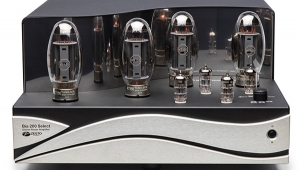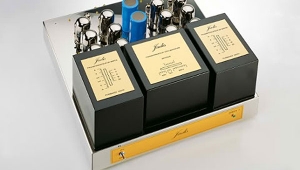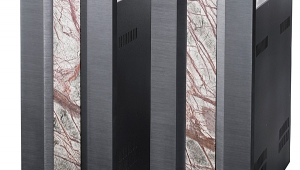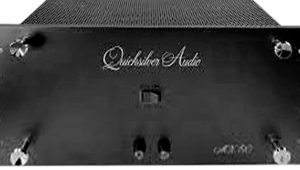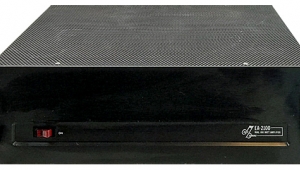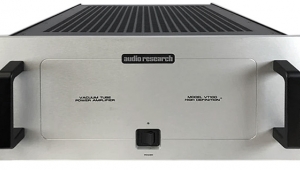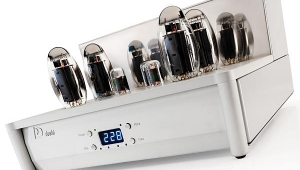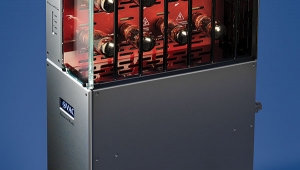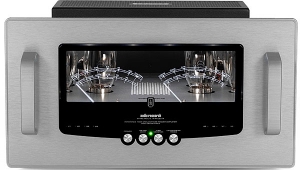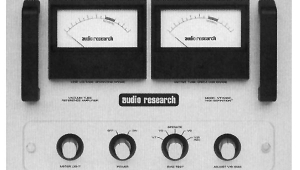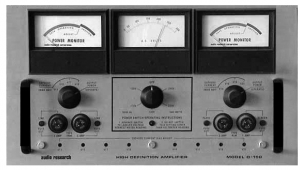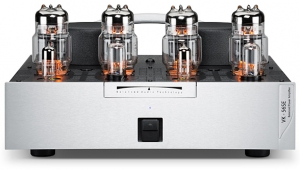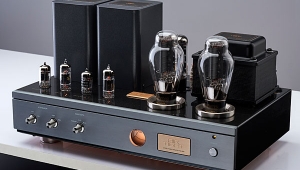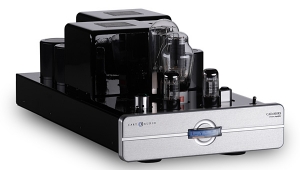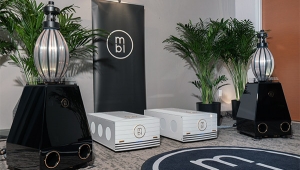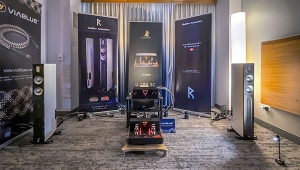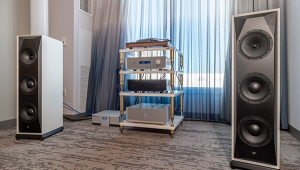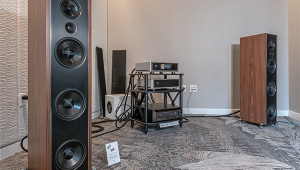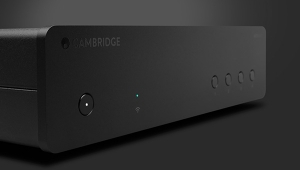| Columns Retired Columns & Blogs |
Rogue Audio M-180 monoblock power amplifier Page 2
I began with vocal music. Listening to the CD layer of the Theatre of Voices' recording of David Lang's Pulitzer Prize–winning Little Match Girl Passion (SACD/CD, Harmonia Mundi HMU 807496) was as engaging an experience as I've ever had with recorded music. Lang's Passion is an accessible modern masterpiece scored for four singers, each of whom also plays light percussion instruments. The text fuses Hans Christian Andersen's tale of the frozen little match girl with texts from Bach's St. Matthew Passion. Each voice and percussion instrument was rendered with an in-the-room weight and realism that had me reminding myself to breathe. Best yet, I sat through the entire 32 minutes of this heartbreaking work without writing down a single note about the sound. With the Rogues, my system simply communicated the music, with less between me and the event than I'd ever heard in my home.
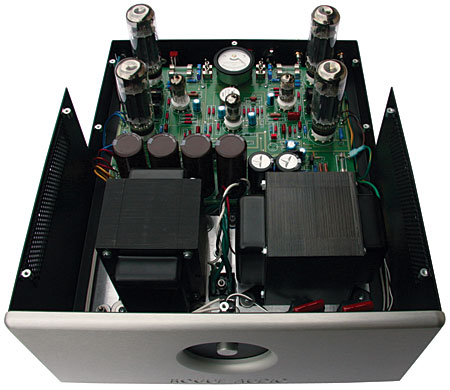
I first listened to the Lang using Sain Line Systems' Pure balanced, a nicely designed interconnect based on cryogenically treated copper that has an open but warm character. Switching to Sain's Reference silver, a balanced ribbon interconnect made of silver, opened up the sound even more without making it too cool or too bright. My impression was that the Rogue M-180s could handle being associated with very revealing equipment and accessories, and that I didn't need cables or other gear with complementary colorations to act as tone controls. In fact, as other equipment came in for review during the Rogues' stay here, the M-180s with Sain Reference silvers proved a very revealing and neutral combination for evaluating the sound of my other gear. The M-180s were also absurdly quiet. With the volume turned up, no music playing, and my ear to the tweeter of a highly efficient Klipsch Palladium PB-17B speaker, I heard almost no hiss.
Turning to music with some fun studio trickery, I put on Alif Tree's jazzy French Cuisine (CD, Compost 205-2), which features samples (including of Nina Simone), electronic music, and some great jazz playing, in an organic fusion of studio production and sweet tunes. My initial reaction: "Holy Bass, Batman!" From the album's very first note, the Rogue M-180s grabbed hold of my Revel F30s' woofers in a way that not even the Musical Fidelity 550k Superchargers, that I wrote about in December 2008, did. In terms of their drive and bass control, the Rogue M-180s didn't sound like tube amps. The overall feel from tunes such as Alif Tree's "Belle" was that my speakers were being driven—not in a tonally aggressive way, but in how the amps and speakers worked together to stop and start each sound. The words articulate and coherent appeared frequently in the notes I took. Some might hear this as a somewhat dry sound, which I suppose it is when compared to a swimmy tube sound. But because their tonal balance was so right, I heard the Rogues imparting a clarity to the system's timing. Usually, pacing and rhythm are achieved at the expense of bass extension and weight; not so with the Rogue M-180s, which somehow maintained great articulation while keeping hold of the deepest bass.
Through the M-180s, each note of the preternatural bass on "Through the Morning, Through the Night," from Alison Krauss and Robert Plant's ubiquitous Raising Sand (CD, Rounder 11661-9075-2), hit my gut like a deep, late-night sob. This album has been criticized, perhaps rightly, for being too rich in the bass, and it's true that bass rarely sounds like this enormous in a live setting. But through the Rogues, what on this album can sometimes sound like bloated bass had a musical impact that was hard to dismiss. The M-180s showed me why producer T Bone Burnett mixed Raising Sand as he did. "Damn reality," I could hear him saying; "I'm going after the emotive power of sound!"
With this drive and bass control, I wanted to hear how well the Rogues could crank. I think it's true that some music works only when it's played loud, and I think that's especially true of the oeuvre of that heavy-metal vanguard from Birmingham, England: Black Sabbath. Listening to the title track of Paranoid (CD, Warner Bros. 3104-2), the quartet's second album, from 1971, rocked me out as hard as I've ever wanted. Not only did the Rogues present Tony Iommi's guitar with the right amount of bite and harmonic clang, but each of Geezer Butler's repeated eight-note bass-guitar picks retained clean articulation and propulsion while still having significant weight. Again, the impression the Rogues gave was that they were in control, driving the speaker in a natural but authoritative way.
Another turn-it-up album is Kanye West's surprisingly thoughtful 808s & Heartbreak (CD, Roc-A-Fella/Def Jam B0012442-02). Since this album's release in 2008, the Auto Tune revolution has admittedly gotten out of hand, yet on this pounding yet sparse record West makes a case for how to use the technology for good instead of evil. As JA would say, this is music that allows for space between the notes. The effect is a refreshing change of pace from most of today's pop music, in which dynamic compression ensures a signal of constant loudness. The Rogues really delivered, humanizing and revealing the cold, often menacing sonic world of 808s & Heartbreak, even at dance-club levels. All of the electronic effects were laid bare yet were still musically understandable. And when actual percussion instruments come in in the coda of "Love Lockdown," it didn't sound like the end of a relationship; it sounded like the end of the world.
- Log in or register to post comments
